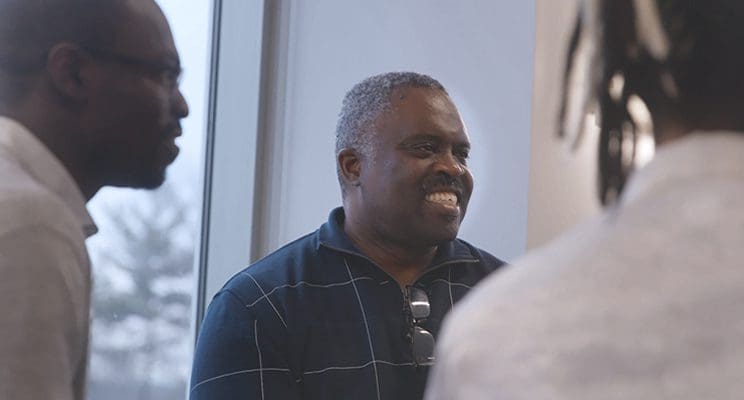
by: Mike Barber
Chief Diversity Officer at GE
Today, we honor the legacy and work of Dr. Martin Luther King Jr. The past year has highlighted all too well that we still have much more work to do to achieve his dream. As I reflect on the many lessons from Dr. King’s life and actions, I am struck by his consistent commitment to hope. Hope for the future. Hope for what we can collectively achieve together… the promised land he so frequently spoke about.
The work we do today will not immediately end injustice and inequality, but it will make real progress. Making progress on tough issues is at the heart of GE’s new Purpose: “Rising to the challenge of building a world that works.” I have been with GE for 40 years and what has always driven me is the big opportunity the company gives us all to make a difference.
I know Larry Culp, GE Chairman & CEO, agrees, which is why last summer, he shared his belief that education is the single most important driver of economic inclusion. With a long history of education and workforce diversity programs, he asked Russell Stokes, Chairman of GE Power Portfolio and President & CEO of GE Aviation Services, and me to work with Linda Boff, GE Chief Marketing Officer and Chief Learning Officer, and the GE Foundation to see where we could make a difference. I am proud to share the GE Foundation is taking the next step on this commitment.
First, we are making contributions to four organizations — National Society of Black Engineers (NSBE), Jackie Robinson Foundation (JRF), Advancing Minorities’ Interest in Engineering (AMIE), and National Action Council for Minorities in Engineering (NACME) – to fund scholarships and leadership development and mentoring programs to help diverse high school students pursue higher education in science, technology, engineering and mathematics (STEM) fields. Some of the initiatives will focus in five GE Cities – Atlanta, Georgia; Cincinnati, Ohio; Greenville, South Carolina; Milwaukee/Waukesha, Wisconsin; and Schenectady, New York – to connect students with GE Volunteers. The programs not only help eliminate financial barriers for students to go to college, they also include immersive summer experiences to help them transition from high school to college. We expect these scholarships and programing to launch as early as this Spring.
Second, the GE Foundation is supporting two innovative development programs with the National Minority Supplier Development Council (NMSDC). These programs will help prepare minority business enterprises (MBEs) for contract opportunities with the U.S. government and corporations. GE is supporting the creation of a Cybersecurity Program that aims to improve the MBEs’ capabilities in a growing industry through the pilot of the first-ever certification program of its kind to become cyber ready. And through the NMSDC Online University, the Lean Supplier Capability Development Program will provide licensed lean e-learning portfolio of courses plus immersive Action Workout sessions facilitated by internal GE lean experts. Together, these programs are aimed to help improve minority suppliers’ ability to operate, be competitive, and win contracts. We expect these programs to launch in the Spring.
Injustice and inequality are not just U.S. issues. While these actions we are taking with the GE Foundation are targeted within the U.S., we continue our work of planning and taking meaningful actions in communities where we live and work around the world. Our fundamental goal is to engage disenfranchised communities purposefully and drive innovative and collaborative solutions to help solve societal challenges. In doing so, we will help the rapidly evolving marketplace succeed and drive sustainable impact locally and globally. Today’s announcement is just the beginning of this important journey. I am eager to roll up my sleeves and work with the GE Foundation and these partners to make meaningful progress.
As Larry said, “the issues we are facing must be addressed at their root cause to ensure we create sustainable change that brings equity and justice to not only our Black communities but all other diverse communities.”



